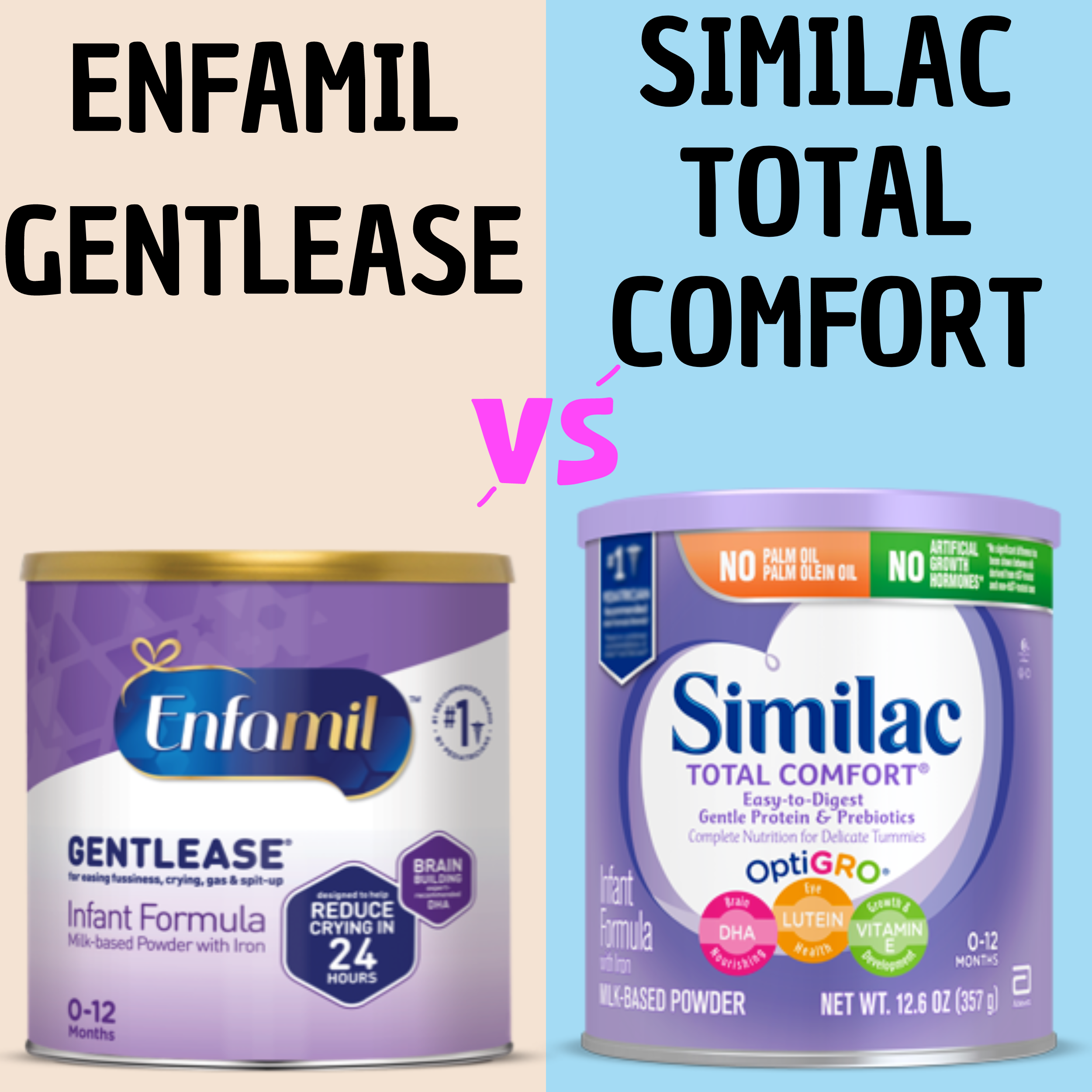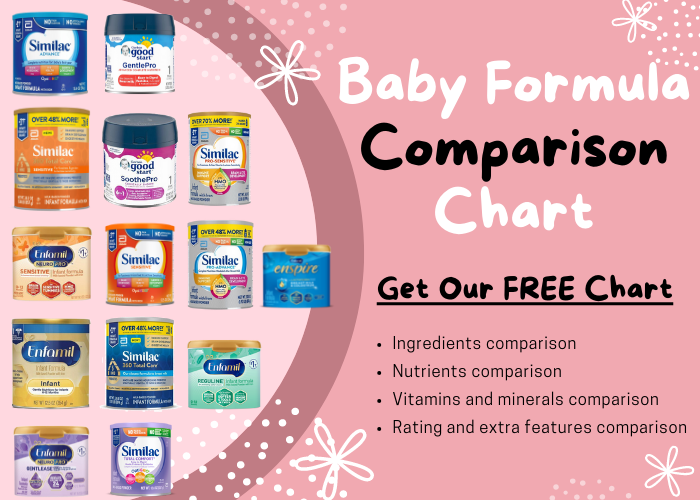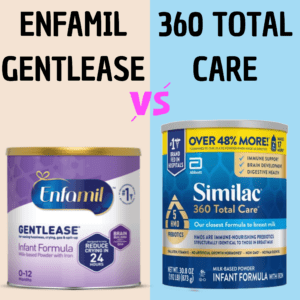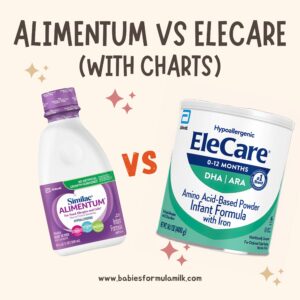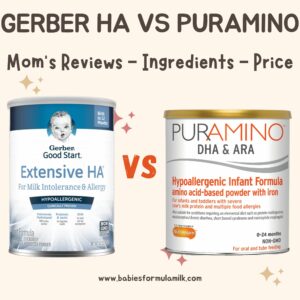Enfamil Gentlease and Similac Total Comfort both cater to infants aged 0-12 months with mild sensitivity such as gas, fussiness, or crying due to lactose sensitivity or milk protein allergy but differ in key aspects:
Similac Total Comfort is non-GMO, contains partially hydrolyzed whey protein, is palm oil-free and 98% lactose-free, and uses maltodextrin and sugar. It also features a prebiotic. In contrast, Enfamil Gentlease uses partially hydrolyzed nonfat milk and whey protein concentrate, is 80% lactose-free, utilizes corn syrup without sugar, and lacks extra features and a GMO-free label.
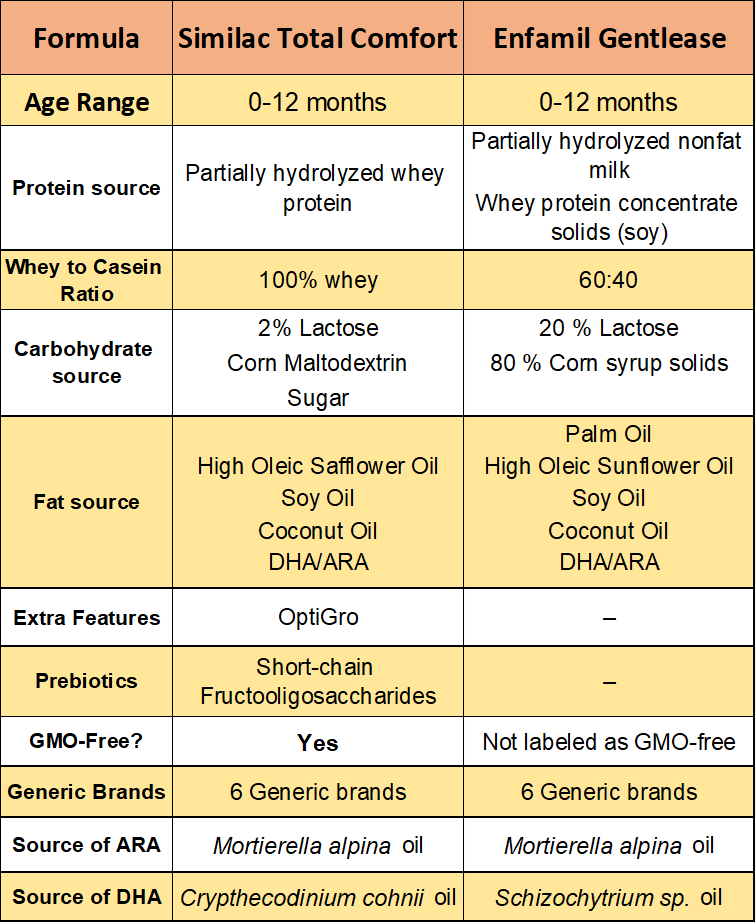
“When you buy something using my links, I may earn a small commission at no additional cost to you. This is a kind of support to me. This website doesn’t accept money for reviews. “
The Best One?
The choice between Enfamil Gentlease and Similac Total Comfort ultimately depends on your baby’s specific dietary needs and sensitivities, as well as your personal preferences. Both formulas have their own set of advantages, here is a summary to help you choose:
Palm Oil: Similac Total Comfort
Similac Total Comfort does not contain palm oil, making it a suitable choice if your baby shows signs of sensitivity or discomfort related to palm oil. Enfamil Gentlease, on the other hand, includes palm oil in its ingredients.
Sugar: Enfamil Gentlease
If your preference is to minimize added sugar in your baby’s diet, then Enfamil Gentlease stands out as the better option. It is completely sugar-free. Similac Total Comfort, however, contains sugar, which may not align with this preference.
Lactose Sensitivity: Similac Total Comfort
For babies with moderate lactose sensitivity or difficulty digesting lactose, Similac Total Comfort provides a solution by reducing lactose content to just 2%.
Casein Allergy: Similac Total Comfort
In cases of a confirmed casein allergy, Similac Total Comfort is a recommended choice. It boasts a unique 100% whey protein formulation, which significantly reduces the casein content.
Price: Similac Total Comfort
Similac Total Comfort is recognized for offering a cost-effective option compared to Enfamil Gentlease. This can be a significant consideration for parents working within a budget.
Gas, Spit-Up, and Colic: Both Formulas
Both Enfamil Gentlease and Similac Total Comfort have positive reputations for addressing these common infant digestive issues. They are specifically formulated to ease gas, reduce spit-up, and alleviate colic symptoms.
GMO Status: Similac Total Comfort
Similac Total Comfort is non-GMO, catering to parents who prefer to avoid genetically modified ingredients. Enfamil Gentlease does not carry the GMO-free label, which may influence the choice of some parents concerned about GMOs.
Vitamins and Minerals: Both Formulas
Both formulas have the essential vitamins and minerals, ensuring that your baby receives the necessary nutrients for healthy growth and development. However, Enfamil Gentlease is enriched with vitamins while Similac Total Comfort is fortified with minerals.
Soft Stomach: Both Formulas
Both Enfamil Gentlease and Similac Total Comfort are designed for sensitive tummies. They are formulated to be gentle on the digestive system, making them appropriate for babies with soft stomachs or digestive sensitivities.
Improving Bowel Movements: Similac Total Comfort
Similac Total Comfort is recognized for its potential to help improve bowel movements in infants. If your baby experiences constipation or irregular bowel movements, this might be an important consideration.
Mom’s Reviews Comparison:
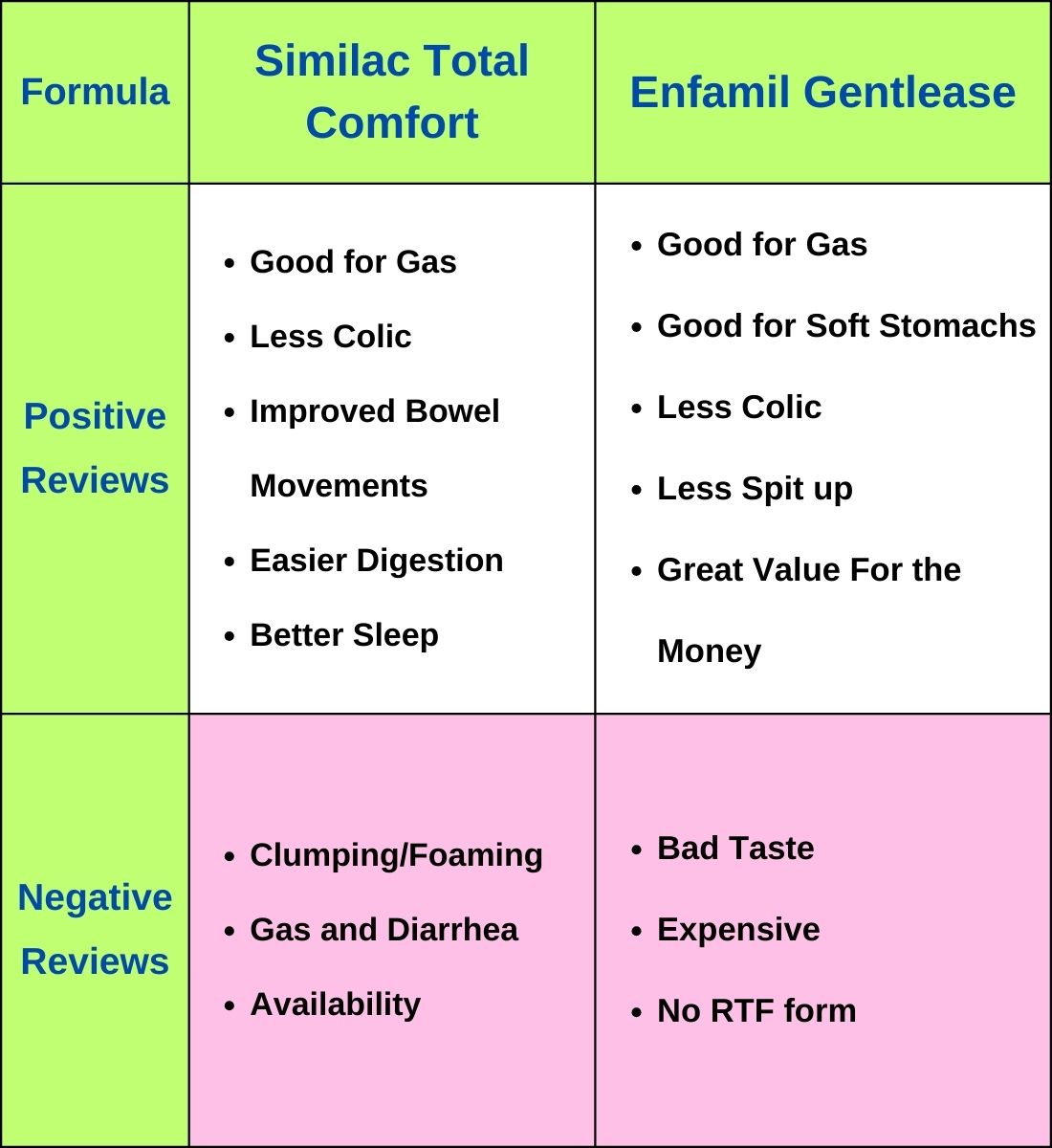
Similac Total Comfort:
- Good Things Moms Like: Many moms love Similac Total Comfort because it makes their baby’s tummy feel better. It helps with issues like gas, colic, and upset stomachs. Babies on this formula often have an easier time going potty, and they sleep better. It’s a great choice if your baby has a sensitive tummy.
- What Some Moms Dislike: While lots of moms are happy with Similac Total Comfort, some say it can get a bit clumpy when you mix it, and it might make some babies gassy or give them diarrhea. Sometimes, it’s not easy to find in stores, so you might need to plan ahead.
Enfamil Gentlease:
- Good Things Moms Like: Moms find Enfamil Gentlease a good choice for babies who get gassy or have sensitive tummies. It helps with colic and makes babies spit up less. Plus, even though it’s expensive many moms have said that it is worth the money.
- What Some Moms Dislike: A few moms mention that their babies don’t like the taste of Enfamil Gentlease, which can be a little tricky when feeding. It’s also a bit pricier than some other formulas. Some moms wish it came in a ready-to-feed form for extra convenience.
Related: Enfamil Neuropro Vs Enfamil Gentlease: Full Comparison
Ingredients Comparison:
Protein Source:
Similac Total Comfort derives its protein from partially hydrolyzed whey protein. This is a key feature, as partially hydrolyzed proteins are broken down into smaller, more digestible pieces. This makes it gentler on an infant’s delicate digestive system, reducing the likelihood of discomfort and colic.
On the other hand, Enfamil Gentlease uses partially hydrolyzed nonfat milk along with whey protein concentrate. While still offering gentle digestion, it includes whey protein concentrate, which might make it a suitable option for some babies who need a different balance of proteins.
Whey-to-Casein Ratio:
Similac Total Comfort boasts a high whey-to-casein ratio with 100% whey protein, making it an excellent choice for infants who require maximum digestibility. Enfamil Gentlease maintains a slightly lower whey-to-casein ratio at 60:40, which remains well-suited for babies with sensitive stomachs.
Carbohydrate Source:
Similac Total Comfort contains 2% lactose, making it an excellent choice for babies with lactose sensitivities. However, it is important to note that Similac Total Comfort does include sugar as part of its carbohydrate sources. The presence of sugar may not be ideal for some parents who prefer to minimize added sugars in their baby’s diet. Additionally, it includes corn maltodextrin, which contributes to its carbohydrate content.
In contrast, Enfamil Gentlease features a higher lactose content at 20% and primarily relies on corn syrup solids as its primary carbohydrate source. It does not include added sugar, which could be an advantage for parents looking to avoid added sugars in their infant’s diet.
Related: Similac Sensitive Vs. Similac Total Comfort
Fat Source:
Similac Total Comfort is palm oil-free, a feature that may be preferred by some parents who wish to avoid palm oil in their baby’s diet. In place of palm oil, it includes high oleic safflower oil, soy oil, and coconut oil. Enfamil Gentlease includes high oleic sunflower oil, soy oil, and coconut oil. Both options offer a blend of healthy fats important for your baby’s growth and development.
Extra Features:
Similac Total Comfort includes “OptiGro,” a blend of essential nutrients (DHA, Lutein, and Vitamin E) designed to support overall infant growth and development. This blend encompasses critical elements for your baby’s well-being, including those required for brain and eye development.
Enfamil Gentlease does not have specific extra features or nutrient blends like Similac’s OptiGro. It focuses primarily on addressing digestive concerns with its partially hydrolyzed protein.
DHA/ARA:
These formulas include DHA (Docosahexaenoic acid) and ARA (Arachidonic acid), crucial for supporting infant brain and eye development. They derive DHA from Crypthecodinium cohnii oil (Similac Total Comfort) and Schizochytrium sp. oil (Enfamil Gentlease), while both use Mortierella alpina oil for ARA.
Prebiotics:
Similac Total Comfort is fortified with short-chain fructooligosaccharides, a type of prebiotic that supports the development of healthy gut bacteria. Prebiotics like these can enhance digestive health and help establish a balanced microbiome in your baby’s tummy, also they play a role in improving bowel movements. On the other hand, Enfamil Gentlease does not explicitly contain prebiotics in its formulation. Prebiotics play a role in improving bowel movement.
GMO-Free:
Similac Total Comfort is GMO-free, offering reassurance to parents who prefer non-genetically modified ingredients. Enfamil Gentlease, however, is not specifically labeled as GMO-free.
Generic Brands:
Both Similac Total Comfort and Enfamil Gentlease have their respective generic alternatives. These alternatives are often more cost-effective while attempting to mimic the key characteristics of the name-brand formulas. Parents who want to save on costs may explore these options. Read Best 6 Generic Similac Total Comfort.
Nutrients Comparison:
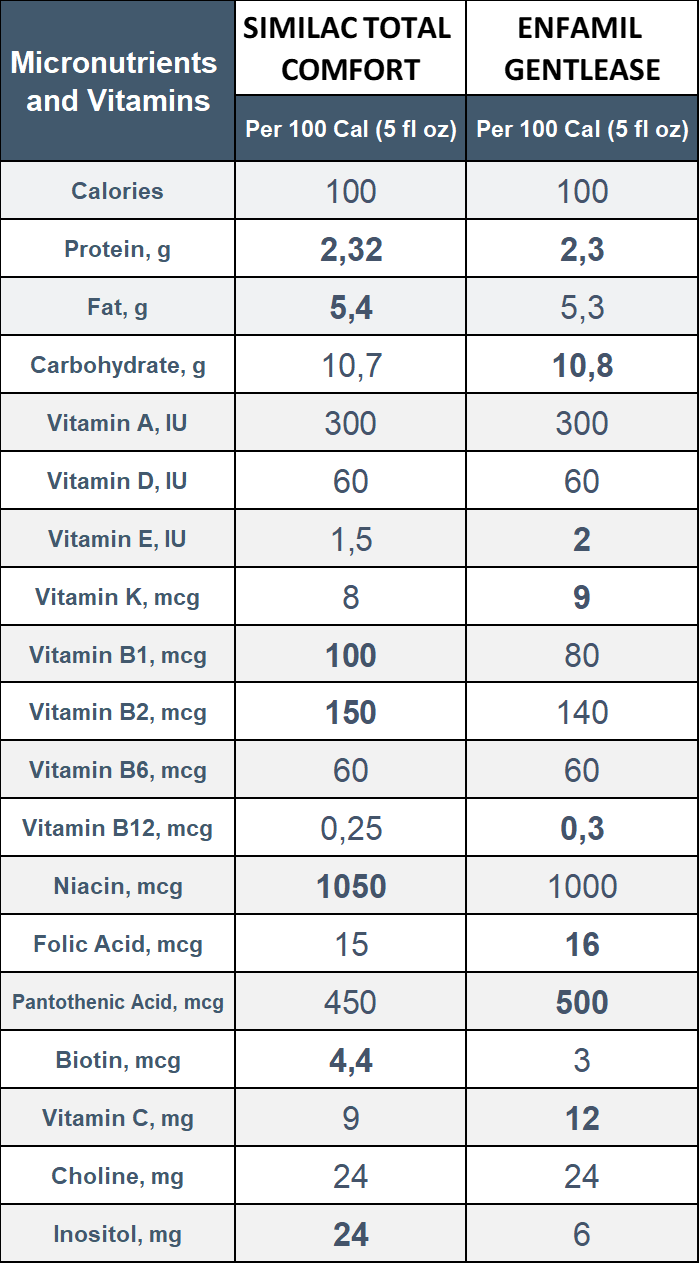
When comparing the macronutrients and vitamins in Similac Total Comfort and Enfamil Gentlease, both formulas provide fairly similar nutritional profiles. Here’s a breakdown of the key nutritional components:
Macronutrients:
Calories: Both Similac Total Comfort and Enfamil Gentlease provide 100 calories per serving, offering an equal amount of energy for your baby.
Protein: Similac Total Comfort contains 2.32 grams of protein per serving, while Enfamil Gentlease offers slightly less with 2.3 grams. The protein content in both formulas is quite close, emphasizing their suitability for infants with digestive sensitivities.
Fat: Similac Total Comfort includes 5.4 grams of fat, while Enfamil Gentlease has 5.3 grams. The difference in fat content between the two formulas is minimal, and both provide essential fatty acids for your baby’s development.
Carbohydrate: Similac Total Comfort contains 10.7 grams of carbohydrates, whereas Enfamil Gentlease has 10.8 grams. Once again, the variation in carbohydrate content is minor and should not be a significant factor in your choice.
Related: Enfamil Gentlease vs. Similac Sensitive
Vitamins:
Vitamin E: Total Comfort contains 1.5 IU of Vitamin E per serving, while Enfamil Gentlease has a slightly higher amount at 2 IU. Vitamin E is important for immune function and skin health.
Vitamin K: Total Comfort provides 8 mcg of Vitamin K, whereas Gentlease offers 9 mcg. Vitamin K plays a crucial role in blood clotting and bone health.
Vitamin B1 (Thiamine): Total Comfort contains 100 mcg of Vitamin B1, whereas Gentlease has 80 mcg. Thiamine plays a vital role in the conversion of food into energy and in the support of nerve function.
Vitamin B2 (Riboflavin): Total Comfort provides 150 mcg of Vitamin B2, while Gentlease offers 140 mcg. Riboflavin is crucial for energy production and overall growth.
Vitamin B12: Similac Total Comfort contains 0.25 mcg of Vitamin B12, while Enfamil Gentlease has a slightly higher amount at 0.3 mcg. Vitamin B12 is vital for nerve function and the formation of red blood cells.
Niacin: Similac Total Comfort offers 1050 mcg of Niacin, while Enfamil Gentlease provides 1000 mcg. Niacin is important for skin health and metabolism.
Folic Acid: Similac Total Comfort contains 15 mcg of Folic Acid, while Enfamil Gentlease provides a slightly higher amount at 16 mcg. Folic Acid is essential for cell division and overall growth, particularly during pregnancy.
Pantothenic Acid: Similac Total Comfort includes 450 mcg of Pantothenic Acid, while Enfamil Gentlease has a slightly higher amount at 500 mcg. Pantothenic Acid is involved in energy metabolism and is necessary for the synthesis of essential fatty acids and cholesterol.
Biotin: Similac Total Comfort includes 4.4 mcg of Biotin, whereas Enfamil Gentlease has 3 mcg. Biotin supports skin, hair, and nail health.
Vitamin C: Similac Total Comfort contains 9 mg of Vitamin C, while Enfamil Gentlease has 12 mg. Vitamin C is important for the immune system and skin health.
Choline: Both formulas provide the same amount of Choline at 24 mg. Choline is essential for brain development and overall growth.
Inositol: Similac Total Comfort contains 24 mg of Inositol, while Enfamil Gentlease offers a significantly lower amount at 6 mg. Inositol plays a role in cell signaling and overall health.
Both formulas provide similar levels of essential vitamins, including Vitamin A, Vitamin D, and Vitamin B6. However, Enfamil Gentlease has a higher amount of Vitamin E, Vitamin K, Folic acid, Pantothenic acid, Vitamin C, and Vitamin B12 whereas Similac Total Comfort contains more Vitamin B1, Vitamin B2, Niacin, Biotin, and Inositol.
Related: Similac Advance Vs Similac Total Comfort: Full Comparison
Minerals:
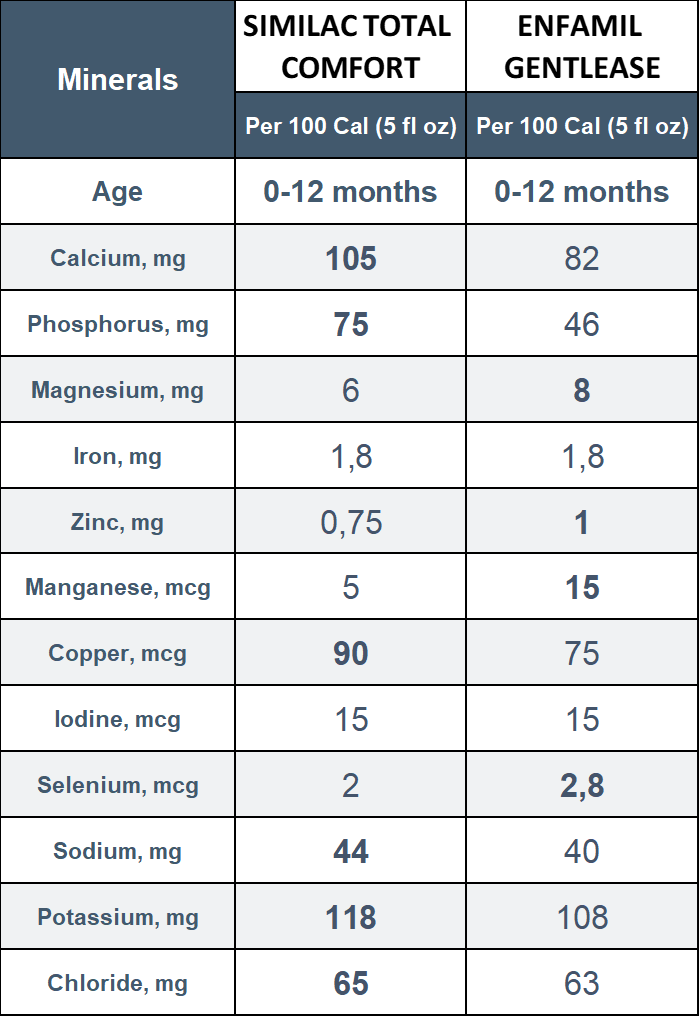
When comparing the mineral content in Similac Total Comfort and Enfamil Gentlease, there are notable differences in the amounts of several important minerals. Here’s a breakdown of these key distinctions:
Similac Total Comfort: Similac Total Comfort offers higher amounts of calcium (105 mg), phosphorus (75 mg), copper (90 mcg), sodium (44 mg), potassium (118 mg), and chloride (65 mg) compared to Enfamil Gentlease. These minerals are crucial for various aspects of your baby’s health, including bone development, nervous system function, and maintaining electrolyte balance.
Enfamil Gentlease: Enfamil Gentlease provides higher amounts of magnesium (8 mg), zinc (1 mg), manganese (15 mcg), and selenium (2.8 mcg) compared to Similac Total Comfort. These minerals play roles in bone health, immune support, and overall growth.
Related: Similac Total Comfort Vs Pro Total Comfort
Price Comparison:
| SIMILAC TOTAL COMFORT | ENFAMIL GENTLEASE |
|---|---|
12.6 oz $18.43 $1.54/oz Buy HERE | 12.4 oz $21.52 $1.74/oz Buy 12.4 oz HERE 19.9 oz $32.86 $1.65/oz Buy 19.9 oz HERE 27.7 oz $44.96 $1.62/oz Buy 27.7 oz HERE |
| 4.5 of 5.0 654 reviews | 4.8 of 5.0 7096 reviews |
| No RTF | No RTF |
Price:
Based on these prices, Similac Total Comfort is generally more cost-effective per ounce compared to Enfamil Gentlease, with a lower price. However, Gentlease comes in multiple sizes which means it’s easy to find it in stores contrary to Total Comfort.
Rating:
In terms of user ratings, Enfamil Gentlease holds a higher rating of 4.8 out of 5.0 based on 7,096 reviews, indicating strong satisfaction among users. Similac Total Comfort, while still well-received, has a rating of 4.5 out of 5.0 based on 654 reviews.
Ready-to-Feed:
Both Enfamil Gentlease and Similac Total Comfort do not come in a ready-to-feed (RTF) form, which means you will need to mix the powdered formula with water to prepare the formula for feeding.
Related: Enfamil Gentlease Vs Enfamil Infant: Full Comparison
Can You Switch From Total Comfort to Enfamil Gentlease?
Yes, it is possible to switch from Similac Total Comfort to Enfamil Gentlease or vice versa. The decision to switch between these formulas may be influenced by factors such as palm oil concerns, sugar concerns, lactose sensitivity, whey allergy, and casein allergy.
How to Switch Between Similac Total Comfort to Enfamil Gentlease?
Switching from Similac Total Comfort to Enfamil Gentlease, or vice versa, should be done carefully to minimize digestive discomfort for your baby. Here’s a general guideline on how to make the transition:
- Consult Your Pediatrician: Before making any formula switch, it’s essential to consult with your baby’s pediatrician. They can provide tailored guidance based on your baby’s specific needs and sensitivities.
- Gradual Transition: Start the transition gradually. Begin by mixing the two formulas. For the first few feedings, use a mixture with a higher proportion of the current formula (the one your baby is already used to) and a smaller amount of the new formula. This might be, for example, 75% current formula and 25% new formula.
- Monitor Your Baby: Pay close attention to how your baby responds during the transition. Look for any signs of discomfort, excessive gas, fussiness, or changes in bowel movements. This will help you determine if your baby is adjusting well to the new formula.
- Adjust Proportions: Over several days, gradually increase the proportion of the new formula while reducing the proportion of the old formula. For instance, you might move to a 50-50 mixture and then to 75% new formula and 25% old formula.
- Full Transition: Continue this gradual transition process until your baby is entirely on the new formula, and their digestive system has had time to adapt.
- Stay Hydrated: Ensure your baby gets enough water during the transition to prevent dehydration. It’s essential to maintain proper hydration, especially when introducing a new formula.
- Observe Digestive Health: If you notice any persistent digestive issues or discomfort during the transition, consult with your pediatrician. They can provide further guidance and address any specific concerns.

